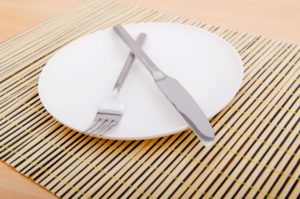Why Starvation Diets Are A Mistake If You Want to Lose Weight

In theory, starvation diets to lose weight actually makes sense. After all, eating too much is one of the main causes of weight gain. Therefore, it stands to reason that eating very little will have the reverse effect.
In truth, however, starving yourself is the worst possible thing you can do when attempting to lose weight. Not only is it bad for your health, but starving yourself doesn’t actually lead to massive weight loss as most people think.
So, if you’re guilty of using starvation diets to get leaner, here’s why you should look for an alternative route to weight loss.
Free Download: Why You Can't Shift Your Belly Fat
Why Starvation Diets Don’t Work
Your Body Will Dive into Survival Mode
The first few days of starvation diets tend to give the illusion that the change in diet or lack of eating is actually working, as you will drop down several numbers on the weighing scale. So people think, “Wow! I am losing weight like never before. This is great. I’m going to stick to this diet.” This is a mistake.
What’s lost is mostly water weight with the loss only lasting a short while. This is because with starvation, the body first expends water weight before falling into a physiological response referred to as ‘survival mode’.
Healthy Muscles Go First
Survival mode is an age-old response whereby the body survives starvation by slowing down its normal metabolism rate and devoting more resources to absorbing whatever little food is available. With starvation diets your body hasn’t decided whether your initial weight loss is a bump in your eating behaviors, or if it’s something you’re going to do long term. Eventually, after somewhere around 5 to 10 days, your body recognizes this as a habitual eating pattern.
It then begins cannibalizing healthy muscles and other tissues in order to continue functioning. Only after every expendable ounce of muscle has been burnt will the body begin dipping into the stored fat reserves for nutrients needed to survive. As all this happens, very little weight is actually lost. So, except for the initial significant drop in weight, starvation diets actually result in a very slow rate of weight loss that can sometimes be unnoticeable.
Starvation Always Ends in Failure
Regardless of how disciplined you are, the human body can’t stand starvation for too long. Therefore, you’ll eventually fall back to normal eating habits especially after weight loss comes to a slow crawl.
With the slowed metabolism and significantly reduced muscle mass, your body will find it hard to burn many calories even when you exercise regularly. And, with the body still in survival mode, any food you consume after a period of starvation will be stored instead of being used up to provide energy. So, all in all, you’ll end up gaining more fat than you had in the first place once you resume normal eating.
Crash And Burn
Starvation diets are called “crash” diets for a reason. You eventually crash and burn, turn to unhealthy foods full of refined sugar, salt, white flour and other weight gain boosters, and put back all the weight you lost. Sometimes you add additional weight. The problem is, crash diets are very restrictive.
They drastically cut the amount of protein, fats, carbohydrates and nutrition you give your body. So your body tells itself, “Okay, I guess is this is the way we are going to eat from now on. Since I am getting nowhere near the nutrition I need on a daily basis, I’m going into starvation mode.”
Your Body Needs Nutrients, Minerals And Vitamins
If you want to lose weight, starvation diets might sound very sexy. They might sound like something that’s exactly what you’re looking for. But nothing could be further from the truth. That’s because during starvation mode, your body recognizes that you haven’t been getting all of the wonderfully healthy nutrients, minerals and vitamins you need for all your body processes to work properly.
When it sees this happening, it begins to store anything and everything you do take in. Unfortunately, this drastically slows down your metabolism, leading to weight gain. Your body is deprived of essential nutrients, so every carbohydrate your body does receive on these restrictive and unhealthy crash diets is hoarded obsessively, and stored as fat for energy use later. This makes weight loss difficult to impossible.
Free Report: Why You’re Not Losing Belly Fat
Healthy weight loss should be gradual. You should be able to consistently lose a small amount of weight every few days and do so without depriving your body of nutrition. If you trim your calories and simple carbohydrates by 15% to 25%, without limiting the amount of healthy foods you eat such as fresh vegetables and fruits, you can sustain this eating behavior.
Are you frustrated because you feel like you’ve been doing everything right, but you’re still not able to lose belly fat? Maybe you’re eating and drinking healthy foods and going to the gym, but the change in diet and exercise isn’t making your midsection smaller. That’s the bad news. The good news is that it’s possible to lose belly fat even though you’re not having success right now. To learn more, download my free report, Why You Can’t Shift Your Belly Fat.


Pingback: The Pitfalls Of Losing Weight Too Fast - How To Get Flat Abs Fast
Pingback: Which Diets Help You Lose More Calories? - How To Get Flat Abs Fast
Pingback: 5 Key Ways To Make Your Body A Fat Burning Machine
Pingback: How Can I Lose Weight When I'm Always Hungry?
Pingback: 10 Healthy Eating Habits That Are Easy to Follow %
Pingback: Why Starving Yourself For Weight Loss Doesn't Work
Pingback: Why Successful Slimmers Steer Clear of Fad Diets